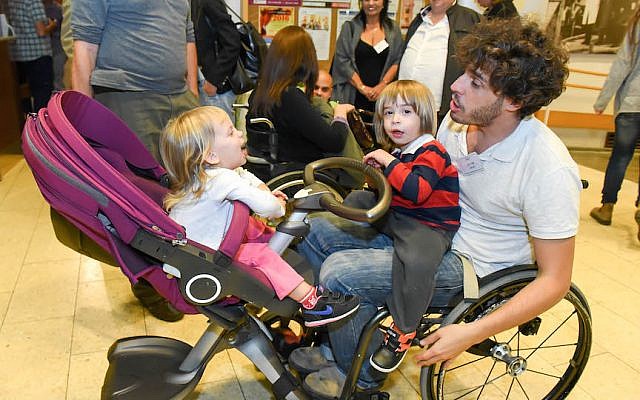Media: The Easystroll wheelchair allows disabled individuals to take their kids wherever they go (Courtesy)
Israeli accelerator program A3i is leading the way in ‘ability’ technology, improving the lives of millions with disabilities
By DAVID SHAMAH
1 December 2015, 7:44 pm
The Times of Israel
Israeli tech has touched many lives around the world, but there’s one group that’s been underserved – the disabled.
“Israel is famous for being the start-up nation, but unfortunately the positive impact of its hi-tech revolution is felt by just 15% of the population,” said Guy Spigelman, who heads PresenTense Israel, which has over the past seven years launched dozens of tech accelerators and hundreds of businesses.
“We believe that the power of innovation should be ignited across Israel, as a tool to grow local economies, build communities and strengthen civil society, so that 100% of the population can enjoy its benefits.”
PresenTense — along with partners Beit Issie Shapira, the Ruderman Foundation and the Jewish Federation of Greater Los Angeles — celebrated last week at the accomplishments of members of an accelerator with a unique mission to help the disabled become more abled.
“Our A3i Venture Accelerator concentrates on developing ideas that can help improve the lives of individuals who are challenged in various ways, employing technology to develop solutions that can help them live better quality lives,” said Spigelman. In fact, added Spigelman, A3i is the first, and so far only, accelerator in the world that concentrates on “ability tech.”
Spigelman spoke to The Times of Israel at the launch of the second round of the accelerator at the Weizmann Institute last week. On the agenda were presentations by the 12 members of the accelerator, which included products to make it easier for the disabled to get around, tech to help individuals with hearing problems communicate more effectively, a novel system – invented in Israel – that uses sound waves to help control spasticity, and even a dating site and social network for people with disabilities and special needs.
A perfect example of what A3i is all about, Spigelman boasted, is Sesame Enable, a graduate of the first round of the accelerator in 2014, which developed a specially rigged Nexus 5 smartphone that allows users to open up applications and make calls using their voice only. Designed for individuals who are almost totally paralyzed, the Sesame device is extremely sensitive: it can detect slight head gestures to trigger actions, for apps and activities where voice is inappropriate.
Sesame Enable was awarded $1 million – the top prize – in a worldwide contest sponsored by US telecom giant Verizon, in which the company searched out top technologies to help people live better lives.
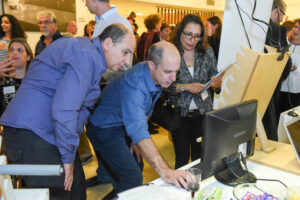 Media: Visitors check out the technology at an A3i event on November 25, 2015 (Courtesy)
Media: Visitors check out the technology at an A3i event on November 25, 2015 (Courtesy)
A3i is a nine-month program that brings together a core group of 12-15 entrepreneurs who want to start new ventures or grow existing ones, along with 50 volunteer coaches, mentors and subject matter experts from a variety of professional backgrounds. This network of committed entrepreneurs and dedicated volunteers works together to launch and grow social ventures, which creates community impact, facilitates access to new partnerships, and builds a support network that lasts beyond the initial program, said Spigelman.
“We don’t charge anything for companies in the program, and we do not take any equity. For us, the objective is to use some of the great tech Israelis are developing to make life easier and more pleasant for everyone.”
It’s not just about helping people, either, said Spigelman. “There are a billion people in the world with disabilities, which means there is a huge market for these technologies – and it’s a market that’s underserved.”
“Israel has developed a lot of great technology to serve these markets; all we have to do is figure out a way to connect the technology with the need, via an app, service, or product, and that’s exactly what we’ve done here,” he stressed.
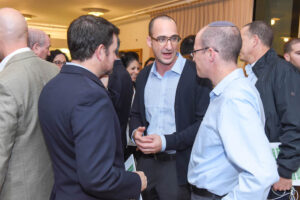 Media: Guy Spigelman (center) at the A3i event November 25, 2015 (Courtesy)
Media: Guy Spigelman (center) at the A3i event November 25, 2015 (Courtesy)
Among the technologies and products at the event was AbiliSense, which uses sensors to detect sounds in the environment and transfers them into alerts – text, images and vibrations – that will get the attention of a deaf person, said Erez Lugasi, the system’s inventor.
“We use big data to differentiate between sounds in the environment, so, for example, if a siren is sounded, the AbiliSense system can tell if it is an ambulance on the way to a hospital, or an alert that a civil emergency is taking place.”
The system uses different combinations of vibrations and different images that are beamed to any connected device – such as a smart watch or a smartphone – enabling a deaf person to “hear” what is going on instead of watching and wondering helplessly.
It’s a companion to another technology developed by three Technion students that helps the blind to easily navigate their environment. Using a Kinect 3D camera, a computer and an Android phone for audio interaction, students Tzahi Simkin, Gal Dalal and Danny Zilber came up with a system that detects oncoming obstacles, and uses audio messages and signals to warn users if they are about to bump into something, telling them how to avoid the obstacle.
The system uses the Kinect camera, Microsoft’s motion sensing input device that takes images, processes them and turns them into 3D immersive views. Those views can be displayed on a screen, as they are when the Kinect is used in tandem with Microsoft’s Xbox 360 and Xbox One video game consoles.
With a little hacking, the team adapted the Kinect to feed its images into a mini-PC, where the images are analyzed. The system determines if there are objects or obstacles in the path of the camera, how close they are, how far to the left or right the user would have to move to avoid them, etc. That data is crunched, and a sound interface issues orders to an Android device, using voice commands or a series of beeps to guide the user around obstacles.
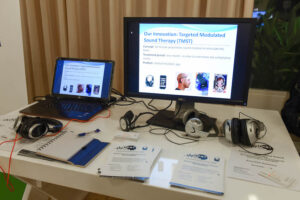 Media: The TMST system on display at the A3i event (Courtesy)
Media: The TMST system on display at the A3i event (Courtesy)
Another technology that was on display was Targeted Modulated Sound Therapy (TMST), discovered and perfected by its Israeli inventor, Debby Elnatan.
“It’s long been known that music has an ability to calm people, but this has never really been scientifically studied,” she said. “I noticed that my son, who has cerebral palsy, would react to certain musical tones, and decided to study this.”
The result was TMST, which is a system to generate tones that can help control spasticity.
“It makes life much easier for CP sufferers, as well as for their caretakers,” said Elnatan. “We’re examining other ways this technology can be used.”
Working with PresenTense on the project is Beit Issie Shapiro, the Raanana-based organization that runs dozens of programs for thousands of disabled Israelis.
“Tech is an inseparable part of improving the lives of individuals with disabilities,” said Shosh Kaminsky, director of community affairs at the organization. “With the rapid advances in technology, we are coming to a point where disabilities will be less of a roadblock to enabling anyone to fully participate in society, opening up new vistas for the disabled.”
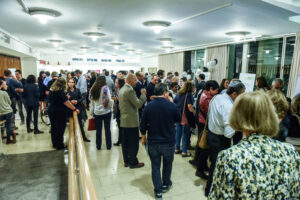 Media: About 500 people attended the opening of the second round of the A3i accelerator at the Weizmann Institute, November 25, 2015 (Courtesy)
Media: About 500 people attended the opening of the second round of the A3i accelerator at the Weizmann Institute, November 25, 2015 (Courtesy)
”Innovation in technology is crucial to further the full inclusion of people with disabilities in our society,” said Jay Ruderman, President of the Ruderman Family Foundation. “That’s why I’m so excited to see all the creative technological solutions that are being developed through the Accelerating Inclusion in Israel partnership. I believe that some of these inventions will change our world for millions of people with disabilities around the world.”
The companies will now work on perfecting their technology, and develop a business plan to promote their ideas in new markets. And Spigelman is confident that the will get a warm reception in those markets.
“The 12 ventures of this special accelerator are going to impact the lives of millions of people, which is fantastic,” he said. “Israel is well placed to play a leadership role, advancing solutions, creating an industry that will generate jobs, and showcasing Israel as solution provider to some of the world’s great challenges.”
Source: www.timesofisrael.com/israel-tech-helps-the-deaf-hear-and-the-blind-see/

